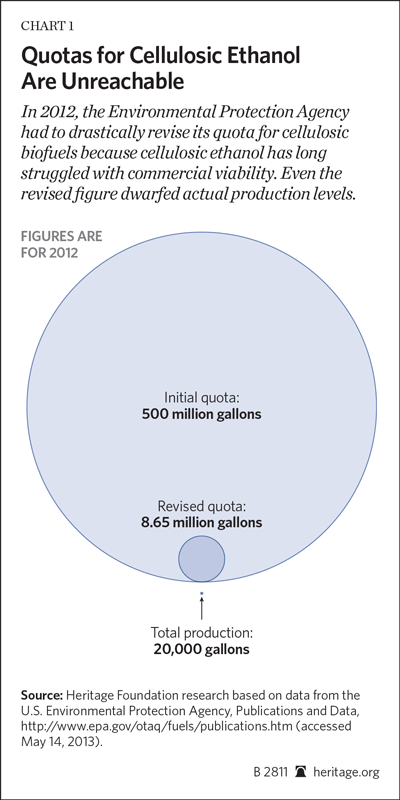Senators John Barrasso (R–WY), Mark Pryor (D–AR), and Pat Toomey (R–PA) introduced a bill today to repeal the Renewable Fuel Standard (RFS). Efforts in the House to do likewise are underway.
The problem with the RFS isn’t corn or farmers or ethanol. The problem is that it is bad governance, has had unanticipated costs, and ignores the fundamental role the market plays in meeting America’s energy needs.
The mandate is bad enough: By giving corn and ethanol producers a guaranteed market, Congress is ignoring consumer preferences and taking away any incentive for biofuel producers to lower costs and compete without the mandate. For example, by 2022 there must be 15 billion gallons of corn ethanol (and no more, as far as meeting the mandate is concerned) in the gas tanks of Americans’ automobiles. No matter that ethanol is essentially a less efficient, watered-down version of gasoline that can cause problems and engine failure in some vehicles. And no matter that the artificially increased demand for corn has also raised the prices of food, potentially by as much as 68 percent.
But the situation is worsened by the fact that the past eight years have shown that the mandate isn’t workable. The mandate requires certain percentages of different biofuels be reached by set target dates regardless of whether they’re viable—or even available. For example, the Environmental Protection Agency (EPA) originally scheduled to have 500 million gallons of cellulosic ethanol (made from inedible plants) on the market by 2012. It had to scale back the mandated quota to 8.65 million gallons, less than 2 percent of the original target.
Even that was problematic, as only 20,000 gallons of cellulosic ethanol had been produced that year. Meanwhile, refiners paid millions in waiver credits or surcharges to meet the mandate. This of course translates into higher prices for Americans who have less of an appetite to fill their tanks as often—another unanticipated consequence of the mandate. In January 2013, a U.S. Court of Appeals struck down the EPA’s requirement for cellulosic ethanol, calling it “unreasonable.”
No one could have guessed how things would work out in 2005, when the mandate was first passed, but with the government overriding decisions that are better left for the marketplace, it should be no surprise that things have gone awry. Congress should never have mandated how much ethanol Americans must use. Given that hindsight is 20/20, it’s high time that Congress raze the mandate on maize.
This piece originally appeared in The Daily Signal



